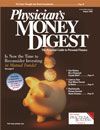Publication
Article
Physician's Money Digest
Realistically Pursue Second Home Dreams
Author(s):
According to the NationalAssociation of Realtors(NAR), second home salesbroke a record last year. In2004, 2.82 million second homes weresold in the United States; that's a 16%increase from the number sold in 2003.Following are some more interesting statisticson the second home craze inAmerica from the NAR:
- The average buyer is age 47 and hasa household income of about $80,000.
- Approximately 9% of US householdsown a second home.
- About 20% of physicians say theyown a second home.
- Second homes are appreciating; themedian price in 2004 was $190,000. In2001, the median price was $162,000, andin 1999, it was $127,800.
- Although 23% of all homes purchasedin 2004 were for investment, themajority of second home purchases arefor recreation/vacation.
- There are 6.6 million vacationhomes in the United States; that number isexpected to grow by an average 125,000new units per year over the next 10 years.
According to the NAR, one reasonfor the growth in second home sales isthe 1997 tax law changes, which allowmost sellers to exclude up to $500,000in capital gains from taxation. Thismeans that you can trade down to asmaller primary residence and use theequity to purchase a second home. "Wecan't say exactly how many are doingthis," notes NAR spokesman WalterMolony, "but about 20% of secondhome buyers in 2003 were using some ofthe equity from the sale of their primaryresidence to buy a second home."
Other factors have also been drivingthe market. "Given that the tax lawchanges coincided with baby boomersentering the peak years when people typicallybuy a second home, it's no surprisewe've seen a strong rise in second homesales," Molony says. "Baby boomers willbe driving the market through the rest ofthis decade." Of course, it doesn't hurtthat investors are looking for new waysto diversify portfolio assets.
Also contributing to the second homebuying trend in the United States is thevolatility of the stock market. Burned byequities, many investors consider realestate a much more stable investment.As with all investments, you need toknow a few things before you buy.Following are several tips for buying asecond home, courtesy of the NAR:
•Research the market. It's often agood idea to rent in the area first to get afeel for amenities and attractions. Forexample, does the area fit your lifestylerequirements? Ask homeowners whatthey like and dislike about the area.
•Shop online. Realtor.com allowsyou to search any area of the UnitedStates and gives you an idea of availableproperties and price ranges, as well ascontacts for local real estate agents.EscapeHomes.com is the largest Web sitedevoted exclusively to resort propertiesand focuses on name destination resorts.
•Consider maintenance. Do youreally want your retreat to turn into anexhausting fixer-upper? If not, then take aclose look at maintenance issues. Is therea large yard that needs to be mowed on aregular basis? Can someone be hired tohandle this chore?
•Choose a reputable realtor. Not allreal estate agents are realtors. Realtorsare obligated to disclose all known materialfacts that could affect the salability ordesirability of the property; this is trueeven in areas where disclosure isn'trequired by law.
•Try a local lender. Although somenational mortgage lenders offer loans forsecond homes, sometimes you'll find betterterms with a local lender in town.
•Confirm insurance availability. Insuranceon second homes is generallymore expensive than primary residences.That's because second homes aren't occupiedfull-time and may be located inremote areas, far from fire hydrants. Somake sure insurance is available. In fact,you may wish to include an insurancecontingency on any purchase offer.
•Consider fire safety. In dryerareas, deciduous trees shouldn't bewithin 20 feet of the house or deck. Inaddition, pine trees should be at least30 feet away from the property.
•Buy flood insurance. If the propertyis in a flood zone, always buy flood insurance.Many people think their homeowner'sinsurance will cover expenses in thecase of a flood, but it doesn't. So talk toyour insurance agent or contact theNational Flood Insurance Program (888-356-6329; www.floodsmart.gov).
•Question water needs. Many secondhomes have wells instead of a communitywater utility, so you may want tohave the well water tested. Also, insteadof sewage systems, many have septictanks, which need periodic treatment.
•Remember the pipes. If the propertyis located in a cold winter location andyou intend to use it year-round, check theheating and insulation.
•Know tax implications. Tax ratesvary, but property taxes and mortgageinterest are fully tax deductible if youdon't rent the property for more than 2weeks per year.
•Remain realistic. If you plan on rentingout the property, don't count on rentalincome to cover all your expenses. Unlessyou have prime property in a name-destinationresort, renting will only cover partof the total costs. Resort specialists oftenhandle property management and marketingas additional services.
Finally, if you do fall in love with apiece of property, before you hand overyour cash make sure you know its zoningclassification and have a certifiedinspector perform an inspection of thehome.
